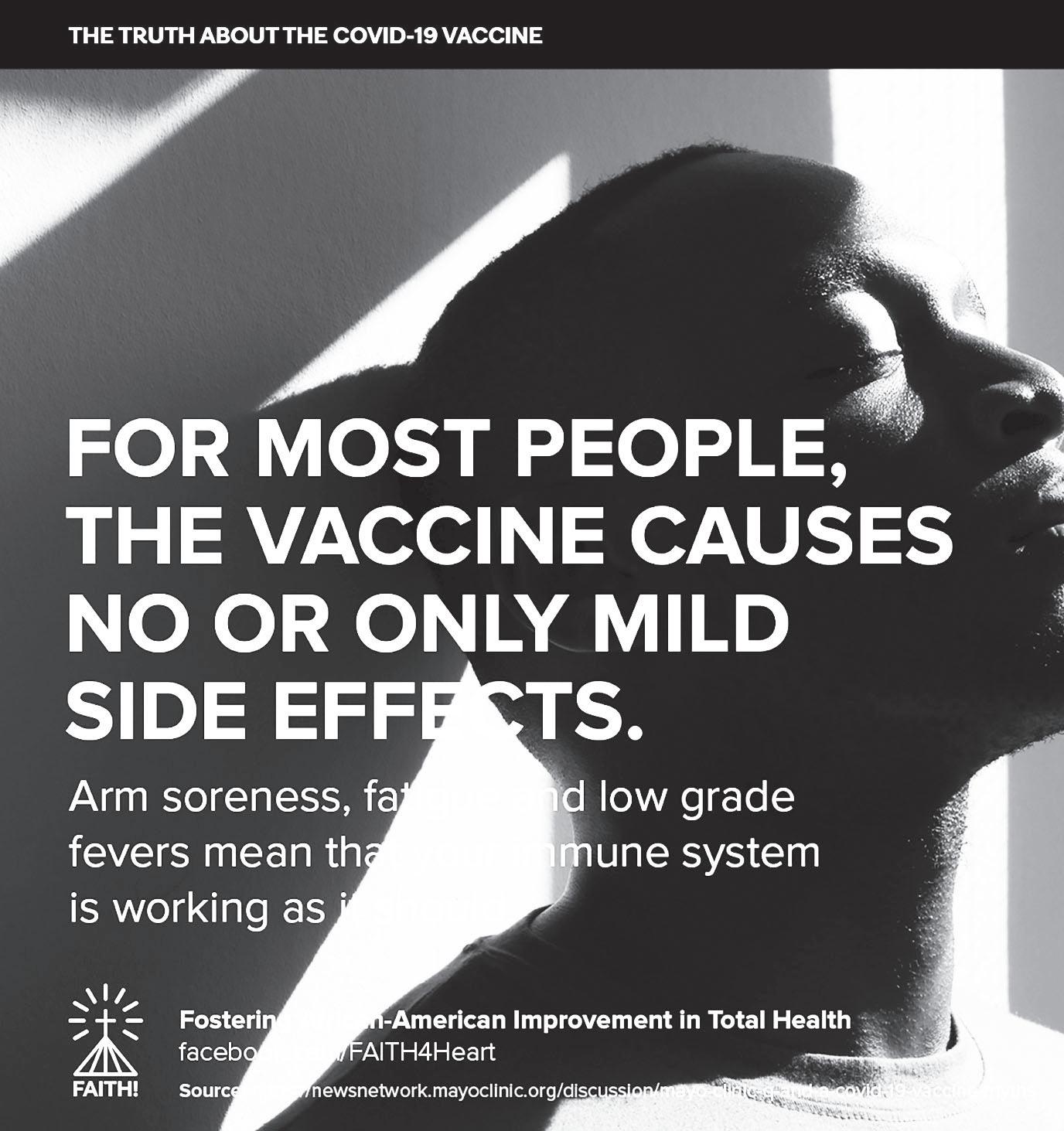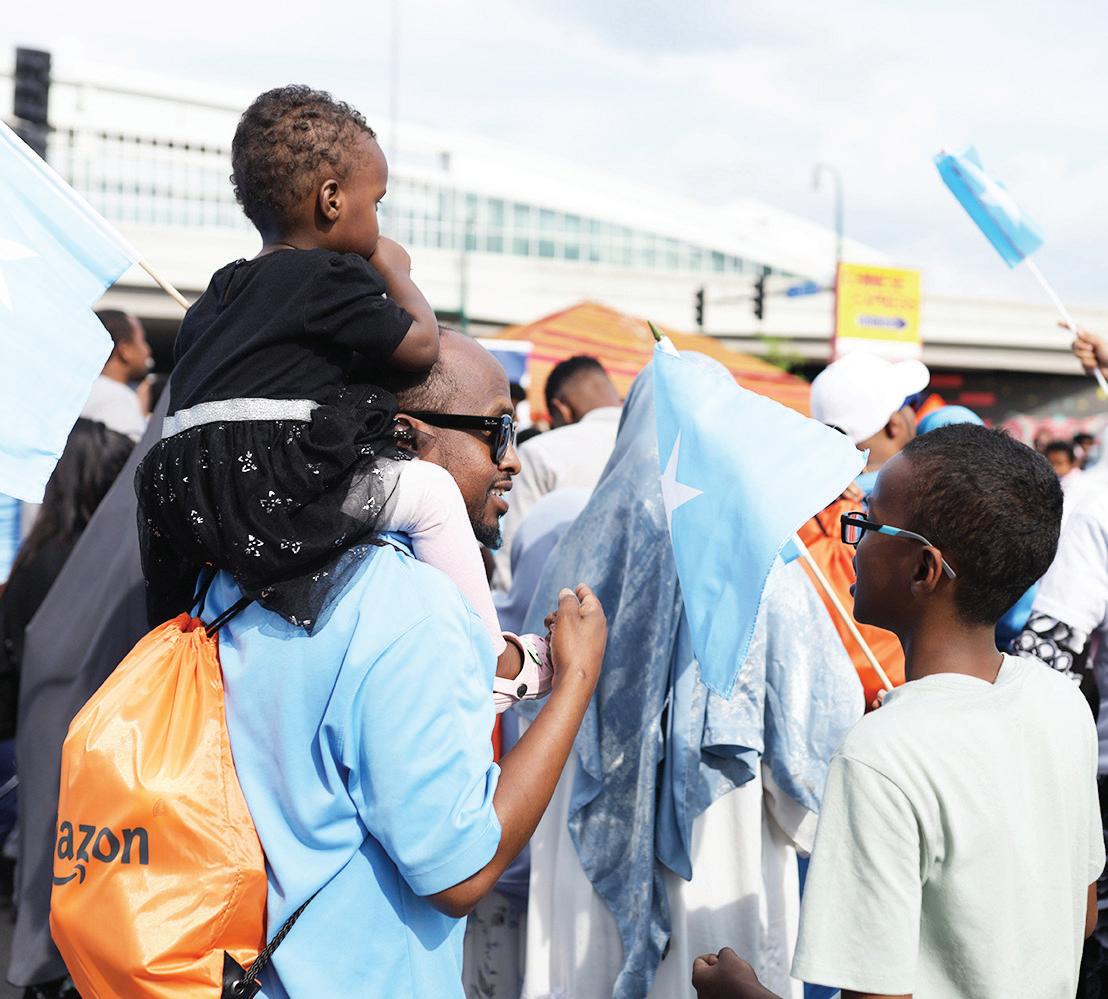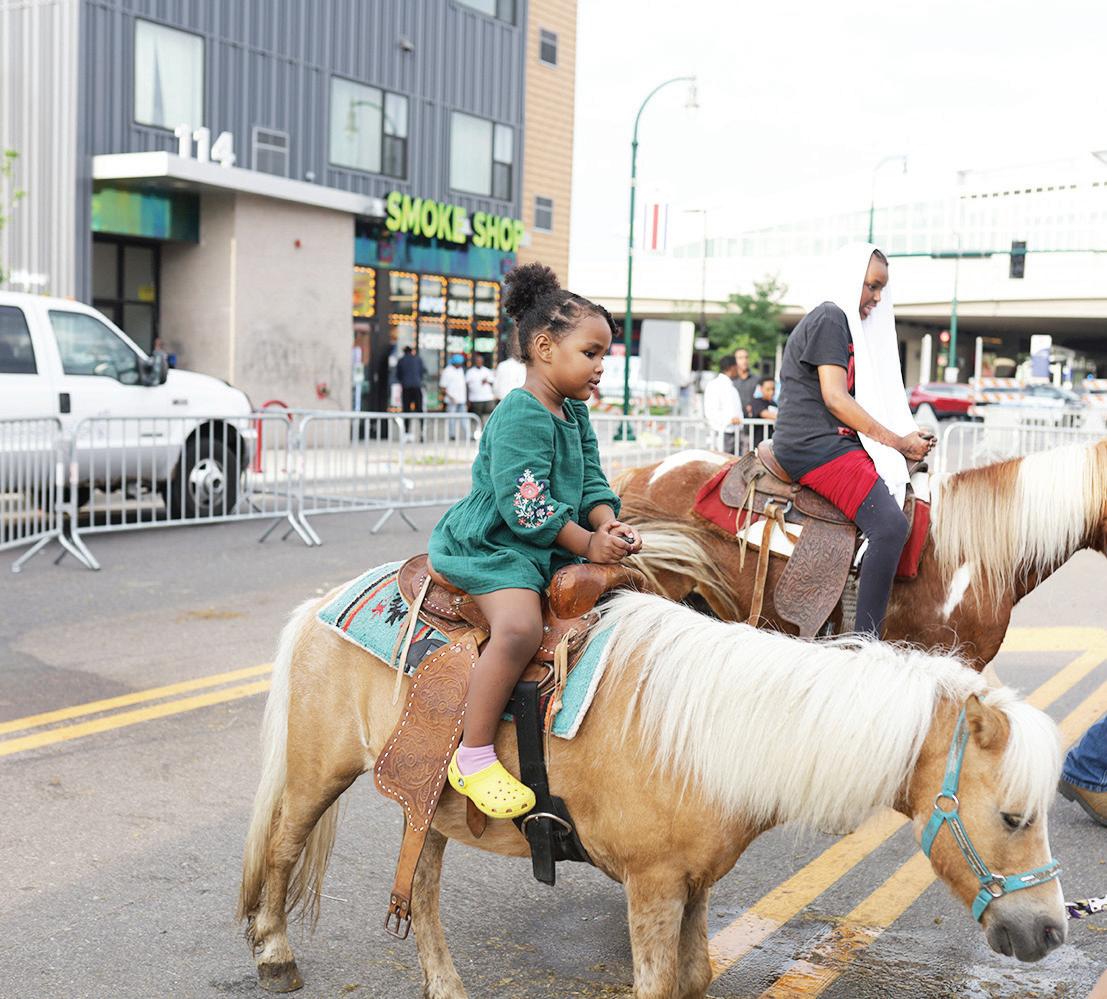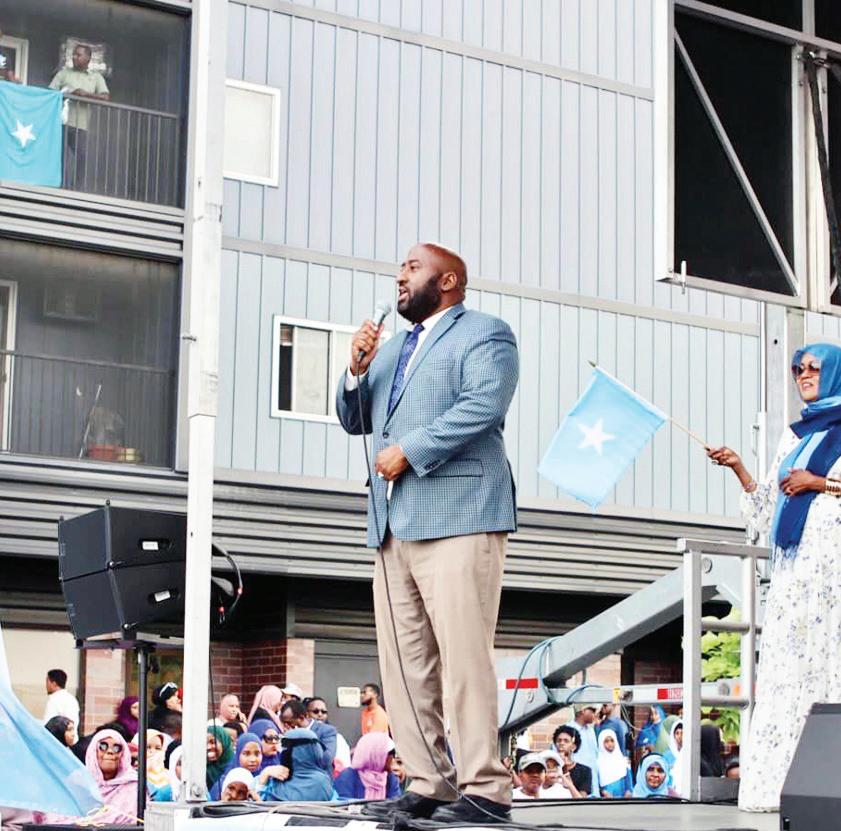THOUSANDS















































































































The decision by the U.S. Supreme Court to end affirmative action in higher education is much more than just a bad ruling; this is an embarrassment on a global scale.
It’s based on the misguided notion that the Constitution, and even our society today, is colorblind. That’s so far from the truth. In reality, what we have is a judicial authority that is in denial; denial of racism, denial of facts, denial of the consequences of this decision, denial of the harm to the people affected, and denial of the hierarchy of human value that this nation was built upon and still reigns supreme in too many minds and institutions today.
Writing for the majority, Chief Justice John Roberts concluded that the approach used by Harvard University and the University of North Carolina violated the 14th Amendment and “cannot be reconciled with the guarantees of the Equal Protection Clause.” That is duplicitous – that clause was designed to remedy the harm caused by denying rights and protection to people of color over centuries. For this court to use it to deny educational opportunities to people of color in the 21st century is hypocrisy at best and cruel at worst. Their decision lacks empathy and compassion for millions.
Our Constitution was conceived in an environment of racial hierarchy. It was dedicated to the proposition that some people were not human. Blacks could be enslaved and had no human rights. During the 1787 United States Constitutional Convention, the infamous Three-fifths Compromise relegated enslaved people to be counted as 3-5ths of Whites in a state’s population.
That created an inequitable and unfair American society. Harvard Professor Roland G. Fryer, Jr. has quantified the consequences. Relative to Whites, Blacks earn 24% less, live five fewer years, and are six times more likely to be incarcerated on a given day.
Hispanics make 25% less than Whites and are three times more likely to be incarcerated. At the end of the 1990s, there were one-third more Black men under the corrections system’s jurisdiction than those enrolled in colleges or universities.
Despite improvement by Blacks and Hispanics, there remain stark differences in access to quality education and opportunity that education affords. In a recent NCHE paper, Susan Eaton, Director of the Sillerman Center for the Advancement
of Philanthropy at the Heller School for Social Policy at Brandeis University, cited the racial disparity in poverty nationwide. About 24% of Native Americans, 20% of Blacks, and 17% of Latinos live in high-poverty neighborhoods compared to just 4 % of Whites. Disparities in schools are even more extreme, with 74% of Black and Latinos, 70% of Native Americans, and just 32 % of Whites attending schools where at least half of the students qualify for free and reduced lunches.
Clearly, American society remains far from a colorblind state where equity and equality are spread across all communities, rich and poor, Black, White, and Brown. It’s astounding that the Supreme Court chose to ignore centuries of racism that has created a society where Blacks, Native Americans, and other people of color are forced to confront bias daily in their everyday life, at school, at work, at play, and in their communities.
But there is hope for America. This Supreme Court is not a reflection of the people. This Court represents the opinions of a minority of our population.
That has been demonstrated by the political uprising after the Court’s rejection of a woman’s right to her own reproductive decisions. We may see a similar reaction to this Court decision limiting access to the nation’s top educational institutions to people qualified to attend but have faced discrimination because of their skin color every day since birth. NCHE has conducted research, which will soon be released, demonstrating that the American people want to put racism and political divisiveness behind us and move forward to create equitable communities.

America made tremendous progress after the murder of George Floyd. A watershed of honesty and sincerity opened up to address the realities of police brutality and the legacy of denial of humanity. Anytime there is a moment creating a seismic wave in society, one representing a transformation from the norm, there will be resistance. In this case, the opposition has a high level of authority and power, but it contradicts the minds and hearts of the majority of America.
The march towards an equitable society will continue.
The author is he Executive Director of the National Collaborative for Health Equity, Senior Scholar at the Center for Advancement of Well-Being at George Mason University, and former Senior Advisor and Vice President of the W. K. Kellogg Foundation. This op-ed was first published on Foreard Times and later made available via the Nationanl Newspaper Publishers Association (NNPA) for member publications.
This week, during the NNPA’s Annual Convention, which celebrated 196 years of the Black Press of America, Biden appeared via video to salute the NNPA and its member publishers on the occasion.
“Congratulations to the Black Press of America for celebrating 196 years of serving communities across our nation,” Biden stated in the address which aired on July 1.
“Ida B. Wells once said, the way to right wrongs is to turn the light of truth upon the wrong. That’s the sacred charge of a free press. That’s the charge African American publishers have pursued for nearly two centuries,” Biden continued.
“With every story you publish, you make our democracy stronger. Thank you for what you do to turn the light of truth wherever your work leads you. Thank you.”
President Joe Biden has always maintained that the Black vote pushed him over the top in his 2020 election victory over Donald Trump.
And it’s never been lost on the president that the pivotal day in his campaign occurred in Charleston, South Carolina, on Feb. 26, when he sat down for a live roundtable interview with Dr. Benjamin F. Chavis Jr., the president and CEO of the National
Newspaper Publishers Association (NNPA), the trade association of the more than 200 African American-owned newspapers and media companies.
Joining Chavis at that campaignturning event were dozens of Black Press publishers and media company owners, and the livestream of that event, followed later in the day by an endorsement from Democratic South Carolina Rep. James Clyburn, catapulted the once slumbering candidacy all the way to the White House.
Dr. Chavis and outgoing NNPA Chair Karen Carter Richards, praised the President for recognizing the importance of the Black Press of America.
“The NNPA is especially honored to hear directly from President Joe Biden for his continued support and advocacy of the importance of the Black Press of America,” Chavis stated. “As we celebrate 196 years of the Black Press, it’s always gratifying and encouraging to have the support of the President of the United States. In the wake of the recent U.S. Supreme Court decisions on civil rights, the Black Press rededicates our journalism to be a clarion voice for freedom, justice, equality, and equity.”
Richards who is the publisher of the Houston Forward Times, also thanked the President.
“To have the President of the United States take the time out to be a part of our convention is of course special,” Richards said. “But, it’s also
a testament to just how vital the Black Press remains. Collectively, as Black publishers and Black business owners, we are stronger than ever and the President’s message reinforces that.”
Newly elected board chair Bobby Henry, publisher of the Westside Gazette in Florida, added, “That message from
President Biden to the association was one that signifies that he remains true to his pledge to value the role African Americans play and have played in this country. Further, acknowledging the role that the Black press plays in reaching our people and those sympathetic to our plight remains a critical component of the 2024 electoral strategy.”
After the U.S. Supreme Court did what many have long expected, strike-down race-based admissions to colleges, Black leaders held emergency press conferences and strategy calls. One convened by Marc Morial on June 29 hours after the Supreme Court’s decision yielded sharp commentary.

Affirmative action refers to a set of policies and practices aimed at promoting equal opportunities for historically disadvantaged groups, particularly in relation to employment or education. The purpose of affirmative action is to address the historical and ongoing systemic discrimination and underrepresentation that has been faced throughout history. Women, racial and ethnic minorities, and individuals with disabilities have been beneficiaries. Typically, affirmative action involves taking proactive steps to increase the representation of these underrepresented groups in areas where they have been historically excluded or marginalized.
The 6-3 ruling by the U.S. Supreme Court will alter college admissions policies. Chief Justice John G. Roberts Jr., writing the opinion for the majority, said the programs “unavoidably employ race in a negative manner” and “involve racial stereotyping,” in violation of the Constitution. The ruling affirmed that race-conscious admissions programs

at Harvard and the University of North Carolina are unconstitutional.
Associate Justice Sonia Sotomayor spoke in person her dissent from the bench which signaled strong disagreement saying the court’s ruling “further entrenching racial inequality in education” will have a devastating impact.”
The decision would seem to be a slap in the face of history as well as real world reality. Currently, a move is on to ban books in many school districts across America with many Republicans calling rudimentary discussion on race “divisive.” Statistics on college enrollment for African Americans demonstrate there is more work to be done to increase enrollment at a time when college costs have skyrocketed.
“I find it interesting to say we’re beyond race in this country when we know that 48 percent of white students admitted to Harvard between 2009 and 2014 either were legacy admissions or they were athletes,” said Maya Wiley, President of the Leadership Conference on Civil and Human Rights.
“This is the first time that we are facing a court that misinterpreted the equal protection clause and our seminal case Brown vs. Board of Education after a predecessor court made very clear what the principals were in the Constitution and in the Brown case,” said Janai Nelson, President of the NAACP Legal Defense Fund during a mid-day press
event held by the National Urban League.
The NAACP Legal Defense Fund has been involved in every case involving affirmative action that has gone to the U.S. Supreme Court.
“Unfortunately, this Supreme Court is trying to have a reality that is more reflective of 1950,” said NAACP President Derrick Johnson.
“Today’s case, let’s be very clear, does not end Affirmative Action but it makes it much more difficult. It narrows the ability of higher education institutions to use their own power to decide who should be in a classroom… we are not abandoning the fight,” Nelson concluded.
“Friends today the Supreme Court got it wrong. I think this day will live in infamy. Because it was one of the most tortured opinions any of us
have ever seen because it’s twisted in terms of its logic on the law,” Damon Hewitt, President of the Lawyers Committee for Civil Rights Under Law.
“Nothing in the opinion stops universities from asking about their race,” Hewit pointed out. “Our advice to students is to continue to talk about your experiences with race and racism,” he concluded.
“This Supreme Court ruling will close the door to educational opportunity for many Black students and students of color who want to attend non-HBCUs. With this new ruling, UNCF knows that more students will turn to HBCUs for their college educations. We also know that our HBCUs will do everything they can to meet increased student demand,” stated a press release from the United Negro College Fund.
 By Panashe Matemba-Mutasa Mshale
By Panashe Matemba-Mutasa Mshale
For the last three decades, Somalia has been one of the most unstable countries in the horn of Africa region. More than 1.5 million Somali citizens have been displaced and ended up in faraway lands since 1991, when a civil war broke out following a coup that ended two decades of Mohamed Siad Barre’s regime.
Most of the Somalis who call Minnesota home were among the first refugees to flee the east African country. Given that history of instability, it might seem strange to some that anyone would celebrate the independence of a country they had to flee.
But that’s exactly what members of the Somali American community during the weekend of July 1 to mark 63 years of the founding of the Republic of Somalia.
“I think it’s important that we have this [celebration] because, even though we are now in Minnesota, we need to remember our history,” said community member Khadar Bille.

Bille was one of thousands of Somali Americans who came to Lake Street
in Minneapolis to celebrate Somalia’s Independence Day. Waving a sea of sky-blue flags, people surrounded the stage on Lake Street, where a lineup of musical artists was scheduled to perform. Further from the stage were Somali business vendors, their tents sheltering them from the oppressive heat. Children’s laughter could be heard over the traditional Somali music playing on the speakers. Attendees enjoyed a range of activities including a petting zoo, face painting, and treats.
The celebration on Lake Street was part of a weeklong series of events for Minnesota Somalis to celebrate their home country’s independence under the banner of “Somali Week”. Events included panel discussions, and cultural and sports events, hosted by Ka Joog, a Minnesota-based nonprofit that organizes annual celebrations of the east African country’s Independence Day.
Many of the Somalis who fled the civil war ended up in Minnesota because of the state’s progressive politics and its robust refugee resettlement agencies. Today, Minnesota is home to more than 86,000 people of Somali descent, more than any other state in the nation, according to Minnesota Compass. As their population grows, they encounter challenges that come
with being Black and Muslim. Festivals like the Independence Day celebration become important tool for combating stereotypes because they give Somalis opportunities to introduce positive aspects of their rich culture to Minnesotans of different backgrounds.
“[The festival] is good representation,” said Abdi Osman, a member of the Somali community. “I’m glad we get to enjoy it and showcase our beautiful culture.”
The origins of the modern Somali state date back to 1884, when European nations began the “Scramble for Africa,” a colloquialism for the imperial conquest of western powers over territories on the continent. Following the conference, Britain took over a large part of Somalia and established British Somaliland. By 1936, Italy had taken over the northeastern sultanates of the country and formed Italian Somaliland, according to Encyclopedia Britannica.
The colonial powers fought for many years over the ownership of their respective territories, with British forces defeating the Italians to add Italian Somaliland to its protectorates after the Second World War. On June 26, 1960, British Somaliland gained independence and became the State of
Somaliland. Five days later, it merged with the Italian Somaliland to become the Republic of Somalia. Today, June 26 of every year is celebrated as Somalia Independence Day while July 1 is Republic Day. Every year, citizens of the country living in Minnesota spend celebrate the two important days in a series of events known as Somali Week. Siham Mahamood, founder of real estate agency Amaana Realty, expressed enthusiasm about being able to have a table at the Somali Week festival for the first time ever. She said she decided to pursue a career in real estate after
Somali Week
Continued on Pg. 6
Continued from Pg. 5
an unpleasant experience she had when purchasing a home in 2019. Her relator was full of prejudices that came from lack of understanding of Somali culture. The experience made her feel compelled to serve her community through real estate by providing a culturally inclusive experience.
“Being able to help my own people is inspiring,” Mahamood said. “I want my people to have a better experience than I did.”
Anwar Juba, a Graphic designer, and his son Abdi Shaur had a table for Juba Graphics, the father’s graphic design firm. Juba has been vending at the festival for many years, where he sells Somalia themed shirts, flags, and banners.
“It’s just fun seeing everyone enjoying themselves while supporting Somaliowned businesses,” Juba said.


Mohamed Ali chatted with a vendor as he indulged in doolsho, a type of Somali sponge cake. Besides his dessert, Ali said his favorite part of the festival was seeing individuals of different ethnicities come together and support Somalis in celebrating their culture and independence.
“I’m just here vibing [sic] with the community,” Ali said. “It’s refreshing to see this kind of unity.”








A week-long soccer tournament to celebrate Somalia’s Independence Day ended on July 3 with Saint Cloud-based GarGaar FC taking home the coveted trophy after defeating KB Stars FC of Minneapolis 4-3 in a tense penalty shootout.
The championship final match, which was held at the James S. Griffin Stadium at Central High School in St. Paul, was the climax of a competitive soccer tournament pitting various teams from Somali communities in North America.

It was clear from the beginning that KB Stars had home field advantage as their supporters didn’t have to travel far from Minneapolis. But it was GarGaar who would strike first when Mohamed Abdi scored in the 58th minute. With their fans urging them on, KB Stars continued to attack in search of an equalizer, which finally came late by way of a Najib Omar goal in the 87th minute.
Omar’s goal sent the stadium into a frenzy with the Minneapolis team’s fans rose from their seats chanting “KB, KB, KB!!”as they waved the Somali flag.
With two of the 90 minutes of regulation remaining, GarGaar substituted their goalkeeper, Mohamed Aden, for Siyad Shale, who is known for making quick saves. When the match ended in 1-1 tie, it went to a penalty shootout to decide who won the trophy. The tension was palpable as fans who had be rowdy for 90 minutes suddenly became silent. When the shootout commenced, GarGaar took the first penalty kick and converted. A KB Stars player followed but missed the goal completely. Although GarGaar did miss a penalty of their own, they converted three more. The last kick went to KB Stars for a chance to tie the shootout and keep chances of a trophy alive, but Shale, the substitute goalkeeper, made an excellent save to guarantee GarGaar win for the second consecutive year.
The soccer tournament was one of many events planned during Somali Week, an annual celebration that takes place around July 1, the east African nation’s Independence Day. This year marked the 63rd anniversary of independence, a day known officially as Somalia National Day. Minneapolis kickstarted Somali Week with an Independence Day festival on July 1, and concluded with the end of a week-long Somali Week soccer tournament that began on June 24. Daoud Mohamed, one of the organizers of Somali Week, said education was this year’s theme.
“It’s about bringing people together to educate each other about our differences, but [also] to celebrate our similarities, as one community,” Mohamed said. “But most importantly, we wanted to create a platform, an opportunity for young people to connect on a positive level.”
With an estimated population of 17 million, Somalia is home to various ethnic groups, languages, and cultures. The Republic of Somalia, as the country is known formally, was formed in 1960 following vicious colonial efforts by Italy and Britain. In 1969, Mohamed Siad Barre came into power and ruled the country until January 1991, when he was overthrown in a coup. Barre’s ouster led to a series of civil wars that have since displaced more than 1.5 million Somalis worldwide.
Thousands of displaced Somalis have sought refuge in Minnesota, where they began arriving in 1993. The population of people of Somali heritage in the state is estimated at 86,000, according to Minnesota Compass, a nonprofit group that analyzes U.S. Census Bureau data. Minnesota’s Somali population is the largest in the United States, making it a sort of unofficial capital of the diaspora, with neighborhoods like Minneapolis’s Cedar Riverside nicknamed “Little Mogadishu,” a nod to Somalia’s capital city.

According to Mohamed, the Somali Week organizer, the tournament comprised of 16 teams, including two from Minnesota, 12 from other states like Maine and Washington, and one each from Canada and the United Kingdom.
Soccer is an integral part of Somali culture. Like in most of the world, soccer in East Africa has been a sport that brings people together, which is why preparations for the tournament are meticulous.
Hussein Mohamed, one of the coaches of KB Stars and an organizer of the tournament, said anticipation for the annual competition begins as soon as a new champion is crowned.
“Tomorrow, [July 4], we start preparing for next year,” he said. “The process of getting ready excites me. We love the game, because we were raised by playing dads. Family members – our oldest brothers, everybody just grew up playing it. [At this tournament] we celebrate good soccer and the independence of our country.”
The match was attended by community elders and important figures, including Somalia’s most celebrated athlete, Abdi Bile, a middle-distance runner who represented his country in Olympics and was once a World Champion. Political leaders like Rep. Samakab Hussein, a Somali American who represents District 65A in the Minnesota assembly, were also present.
Hussein commended the community for raising funds from individual and private donors to pay for the cost of carrying out the Independence Day events.
“This wasn’t city money,” Hussein said. “It wasn’t county money. It was the donors, [and] individuals that came together and made this happen.”
Donnie Brooks, a Twin Cities community member, who is also the director of athletics at Macalester College, said the event was important because it gave Minnesotans insight into Somali community and its culture.
“They are not only unbelievable group
of people who are organizing the event, but it’s just a really beautiful thing to see the culture and excitement” Brooks said.


After the match, officials and leaders congratulated both teams for their efforts and good sportsmanship. They presented KB Stars players with medals and a second-place trophy. The tournament officially ended when Hussein, the lawmaker, presented GarGaar with their championship trophy.



NAIROBI, Kenya (RNS) — Catholic bishops in South Sudan are calling for reexamination of the peace deal the country has implemented with international support for five years, warning that the pact is based on a flawed model that may never bring peace to the world’s newest nation.
The bishops claim the pact, which ended the 2013-2018 civil war in newly independent South Sudan by requiring the two sides to share power, failed to resolve the primary causes of the conflict and instead has allowed political leaders to extend their power at the expense of ordinary people.
“It is a flawed process and there will never be peace in South Sudan as long as the international community insists on this type of model,” the bishops, led by Archbishop Stephen Ameyu Martin Mulla of Juba, the country’s capital city, said in a statement Friday (June 30). “We call upon all parties, as well as regional and international mediators, to examine anew, the method which truly benefits the people.”
The South Sudanese government and the rebel opposition signed the peace deal, known as the Revitalized Agreement on the Resolution of the Conflict in South Sudan, in Addis Ababa, Ethiopia’s capital, on Sept. 12, 2018, seven years after the largely Christian country gained independence from neighboring Sudan.
The bloody war had pitted forces loyal to President Salva Kiir Mayardit, from the Dinka ethnic community, against those aligned with the first vice president, Riek Machar Teny, a member of the Nuer ethnic community and the leader of the rebel group Sudan People’s Liberation Movement-In-Opposition.
By the time it ended with the signing of the agreement and the formation of a government of national unity, thousands of people had died.
Since the pact was signed, however, violence has continued as the transitional government devised by the agreement struggles to implement its provisions, including integrating rival forces into one army, enacting a new constitution and laying the groundwork for a general election.
A planned polling period was originally set for February 2023 but was pushed to December 2024. In March, the country’s leaders recommitted to the agreement, but meanwhile the United Nations estimates that more than 8 million South Sudanese require food aid as a result of continued fighting and other disruptions.
The bishops are concerned that the revitalized agreement focuses too much on the leaders of the key political parties and ignores the needs of ordinary citizens, according to the Rev. John Gbemboyo Joseph Mbikoyezu, the coordinator of the Sudan Catholic Bishops Conference.
“It is not addressing the concerns of ordinary people. There is nothing to show it wants to solve the problems of the communities,” Mbikoyezu told Religion News Service.
Although the clerics want all parties
to fully implement the agreement, they question whether the current model, which asks continually warring elites to think beyond their own power bases, is a sustainable mechanism for development, peace and justice.
“The current power-sharing government needs to demonstrate political will to bring about a just and peaceful dispensation in the country. Indeed, given the degree of trauma of major political actors, it’s unlikely that they have the capacity to do so, even if they wanted,” said the clerics.
The bishops’ position has drawn surprise from other Christian leaders involved in the peace process, but Francis Kuria Kagema, general secretary of the African Council of Religious Leaders and executive director of the Interreligious Council of Kenya, said he backed the bishops’ call for a new understanding.
“The transitional arrangement is kept in place by the blackmail of renewed widespread violence. That is why simmering conflicts are allowed,” Kagema told RNS. “The political and military leaders in Juba must not keep the transitional arrangement in perpetuity while conflict festers.”
Meanwhile, the bishops have condemned human rights abuses, including killings, looting and rape, and denial of access to essential services, including water, electricity and food, to civilian populations in the ongoing war in Sudan.
The bishops are also expressing a deep concern about the regional and international component of the war.
“The conflict is destabilizing the whole region, already (left) fragile and weakened by internal conflicts. We call upon the international community to prevail over Sudan’s warring parties to choose dialogue.”
LOS ANGELES (AP) — More change is afoot at the Grammys. The Recording Academy announced on June 13 that three new categories will be added to the awards show in 2024: best pop dance recording, best African music performance, and best alternative jazz album.
In addition, two existing categories have been moved to the general field, which means that all Grammy voters can participate in selecting the winners: producer of the year, non-classical, and songwriter of the year, non-classical, the latter of which was first introduced this year.
Previously, the general categories were made up solely of the “Big Four” awards: best new artist, as well as album, record, and song of the year. Grammy voters are eligible to vote in general categories, as well as up to ten categories across three genre fields — and are instructed only to vote in their area of expertise. The changes to those two categories reflect an evolving music industry, where songwriters and producers have become increasingly celebrated for their contributions.
The new best African music
performance category will highlight “regional melodic, harmonic and rhythmic musical traditions,” according to a Recording Academy press release, including genres like “Afrobeat, Afrofusion, Afro Pop, Afrobeats, Alte, Amapiano, Bongo Flava, Genge, Kizomba, Chimurenga, High Life, Fuji, Kwassa, Ndombolo, Mapouka, Ghanaian Drill, Afro-House, South African Hip-Hop, and Ethio Jazz.”
Before the addition, those artists would compete in the best global music performance category, first introduced in 2022 as part of the global music field.
Prior to 2020, the field was previously referred to as “world music.” The Grammys enacted the name change to curb “connotations of colonialism,” according to a press release.
The best pop dance recording category is defined by “up-tempo, danceable music that follows a pop arrangement” and recordings that “feature strong rhythmic beats and significant electronic-based instruments with an emphasis on the vocal performance, melody and hooks.” Dance remixes do not apply.
And finally, the best alternative jazz album category will spotlight alternative jazz albums that blend
genre, hybridizing jazz and other musical styles including “R&B, Hip-Hop, Classical, Contemporary Improvisation, Experimental, Pop, Rap, Electronic/ Dance music, and/or Spoken Word.”
“The Recording Academy is proud to announce these latest Category changes to our Awards process. These changes reflect our commitment to actively listen and respond to the feedback from our music community, accurately represent a diverse range

of relevant musical genres, and stay aligned with the ever-evolving musical landscape,” Recording Academy CEO Harvey Mason jr. said in a statement.
“By introducing these three new Categories, we are able to acknowledge and appreciate a broader array of artists,” he said. “We are excited to honor and celebrate the creators and recordings in these Categories, while also exposing a wider range of music to fans worldwide.”
Darnell and Denna, adopted 16-year-old Isaiah YOU CAN’T IMAGINE THE REWARD

His first football season, Isaiah told us, ‘Wear a jersey with my name on it. I want everyone to know you’re here for me.’

Join Books For Africa supporters from near and far in Minneapolis, Minnesota to celebrate 35 years and launch our newest initiative: A Book For Every Child.




The event features dinner, live music, and the chance to connect with BFA supporters from around the world.
SEPTEMBER 13TH, 2023






